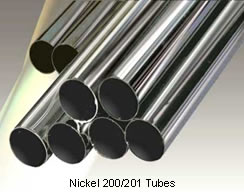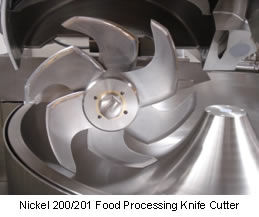NICKEL 200/201
UNS Number N02200/N02201
Nickel 200 and Nickel 201 are solid solution strengthened, commercially pure wrought materials with good mechanical properties over a wide range of temperatures and excellent resistance to many corrosives, in particular hydroxides. Nickel 201 was a modification of 200 to control carbon (.02 max) which keeps it from being embrittled by intergranular precipitates at temperatures of 600° F to 1400° F in many processes. Typically, the elemental restrictions of both, nickel 200 and nickel 201, are combined into one, dual-certified chemistry resulting in a single alloy with the desired characteristics of both alloys, Nickel 200/201.
In what forms is Nickel 200/201 available at Haohua Industry?
Sheet
Plate
Bar
Pipe & Tube (welded & seamless)
Fittings (i.e. flanges, slip-ons, blinds, weld-necks, lapjoints, long welding necks, socket welds, elbows, tees, stub-ends, returns, caps, crosses, reducers, and pipe nipples)
Wire

What are the characteristics of Nickel 200/201?
Highly resistant to various reducing chemicals
Excellent resistance to caustic alkalies
High electrical conductivity
Excellent corrosion resistance to distilled and natural waters
Resistance to neutral and alkaline salt solutions
Excellent resistance to dry fluorine
Widely used to handle caustic soda
Good thermal, electrical and magnetostrictive properties
Offers some resistance to hydrochloric and sulfuric acids at modest temperatures and concentrations
Nickel 200 is normally limited to service at temperatures below 600° F. At higher temperatures Nickel 200 products can suffer from graphitization which can result in severely compromised properties. When operating temperatures are expected to exceed 600° F, carbon content becomes critical. The lower carbon content of Nickel 201 makes the material resistant to graphitization and therefore less subject to embrittlement. Nickel 200 & 201 are approved for construction of pressure vessels and components under ASME Boiler and Pressure Vessel Code Section VIII, Division 1. Nickel 200 is approved for service up to 600° F while Nickel 201 is approved for service up to 1230° F. Melting point is 2615-2635° F.
Nickel 200 (UNS N02200) Chemical Composition, %
| Ni | Fe | Cu | C | Mn | S | Si |
|---|---|---|---|---|---|---|
| 99.0 min | .40 max | .25 max | .15 max | .35 max | .01 max | .35 max |
Nickel 201 (UNS N02201) Chemical Composition, %
| Ni | Fe | Cu | C | Mn | S | Si |
|---|---|---|---|---|---|---|
| 99.0 min | .40 max | .25 max | .02 max | .35 max | .01 max | .35 max |

In what applications is Nickel 200/201 used?
Food processing equipment
Marine and offshore engineering
Salt production
Caustic handling equipment
Manufacture and handling of sodium hydroxide, particularly at temperatures above 300° F
Reactors and vessels in which fluorine is generated and reacted with hydrocarbons
Applications where Nickel 200-201 can be used include chemical processing and storage, synthetic fiber production, and processes where sodium hydroxide and fluorine is used. Other applications include aerospace and defense as well as food processing. Nickel 200/201 has exceptional resistance to caustic alkalies at various temperatures and concentrations.
Nickel 200/201 ASTM Specifications
| Pipe Smls | Pipe Welded | Tube Smls | Tube Welded | Sheet/Plate | Bar | Fitting |
|---|---|---|---|---|---|---|
| B161 | B622 | B161 | B622 | B162 | B160 | B163 |
Mechanical Properties
Room Temperature properties of Various Products
| Product Form | Condition | Tensile (ksi) | .2% Yield (ksi) | Elongation (%) | Hardness (HRB) |
|---|---|---|---|---|---|
| Rod & Bar | Hot Finished | 60-85 | 15-45 | 55-35 | 45-80 |
| Rod & Bar | Cold Drawn/Annealed or Hot-Finished/Annealed | 55-75 | 15-30 | 55-40 | 45-70 |
| Plate | Hot-Rolled/Annealed | 55-80 | 15-40 | 60-40 | 45-75 |
| Sheet | Annealed | 55-75 | 15-30 | 55-40 | 70 max |
| Tube & Pipe | Seamless Annealed | 55-75 | 12-30 | 60-40 | 70 max |
- Preview:Nickel Alloy 276
- Next: Nickel Alloy 22





